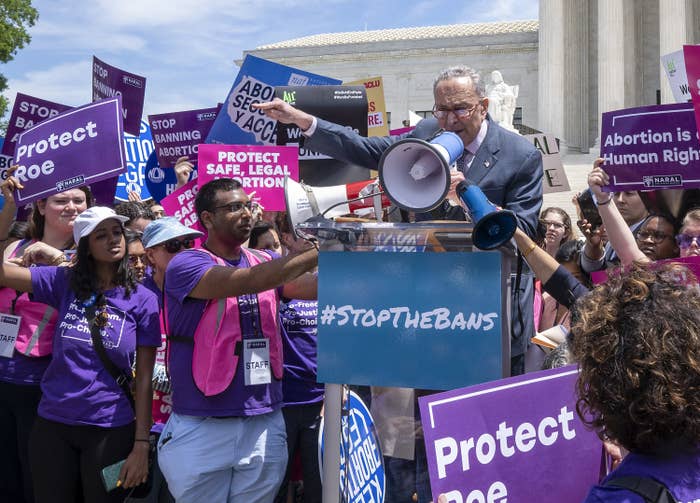
A federal judge blocked the most restrictive abortion law in the country Tuesday, a piece of legislation that is almost a complete ban on any abortion procedure in Alabama.
The law — which was signed in May and met with nationwide protests — was slated to go into effect Nov. 15, but US District Court Judge Myron Thompson in Alabama issued a preliminary injunction Tuesday morning, blocking it from taking effect “until the court resolves the case in full,” he wrote.
On top of banning abortion nearly entirely — it allows the procedure only when the woman’s life is at risk and with no exceptions for pregnancy in the case of rape or incest — the law called for any doctors who performed the procedure to be sentenced to anywhere from 10 years to life in prison.
In his decision, Thompson said that while prior Supreme Court decisions on abortion allow for certain regulation of the procedure, the Constitution clearly “forbids the prohibition of abortion prior to fetal viability.” He added that the prevention of bans on abortion before a fetus could live outside the womb is a “bright-line rule,” and that the clinics, patients, physicians, and organizations challenging Alabama’s law are likely to win the case.
“The plaintiffs are likely to succeed in showing that the [law] violates an individual’s constitutional right to obtain a pre-viability abortion, and thus that it violates her constitutional rights,” Thompson wrote, “and the defendant agrees.”
The defendant, Alabama Attorney General Steve Marshall, has acknowledged that legal precedent on abortion goes against the law he is defending. But the law was not introduced, passed, and signed with the expectation it would actually go into effect.
Around the time that the Alabama law was passed, several other states with Republican-majority legislatures passed similarly restrictive abortion laws (though Alabama’s was by far the most strict): Mississippi, Ohio, Louisiana, and Georgia passed bans on abortion after about 6 weeks, before many women even know they are pregnant, and Arkansas signed a ban after 18 weeks of pregnancy. All these laws have been challenged in court, and all of them have either already been blocked by a judge or almost certainly will be.
Anti-abortion legislators and proponents have written and passed laws like Alabama’s not so that they will actually go into effect in the states, but in the hope that when the laws are inevitably challenged in court they will eventually reach the Supreme Court, be taken up by the justices, and potentially change the interpretation of the Constitution as it relates to abortion.
This is a concerted effort that has been going on for years, but since President Donald Trump appointed two Supreme Court justices, Neil Gorsuch and Brett Kavanaugh, both of whom have a history of ruling in favor of anti-abortion causes, activists and legislators in the states have seen this as their chance to potentially weaken or, ideally, overturn Roe v. Wade.
Just a few weeks ago, at the beginning of October, the Supreme Court announced it would take up another major abortion case, which pertains to a 2014 Louisiana law that requires hospital admitting privileges for abortion clinics. That law is not a ban — but if the court lets the law stand, it could open the door for many more regulations on abortion clinics and end up causing the closure of clinics around the country that can’t meet the new restrictions.
Laws restricting the abilities of abortion clinics to function have successfully already closed many clinics in Alabama and other states with conservative legislatures. Even though Alabama’s law will not be implemented for now, accessing abortion in the state will remain extremely difficult for many of its residents.
"While we are relieved to learn that abortion will remain legal in Alabama for the foreseeable future, this changes nothing when it comes to the crisis marginalized communities have faced and will continue to face when it comes to accessing a termination,” the Yellowhammer Fund, an organization in Alabama that helps women pay for and travel to abortion appointments, said in a statement on Tuesday.
“Conservative lawmakers hope that the American public will forget about our state and those who remain unable to easily, quickly and affordably access safe abortion care even with the total abortion ban being put on hold,” the statement continued.
Even if the US District Court in Alabama ultimately rules that the law is unconstitutional, the state is likely to appeal.
